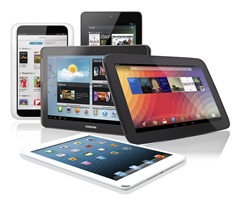 My colleagues at Teleread have been a little tablet-obsessed lately. Paul wonders if the sluggish tablet market will rebound as customers see these devices as a cheaper alternative to Amazon’s premium-priced e-book readers. And Chris points out that for basic reading, most readers don’t even need the latest features.
My colleagues at Teleread have been a little tablet-obsessed lately. Paul wonders if the sluggish tablet market will rebound as customers see these devices as a cheaper alternative to Amazon’s premium-priced e-book readers. And Chris points out that for basic reading, most readers don’t even need the latest features.
Personally, I am a whole-hearted fan of the cheap tablet as a thing, primarily because I am soon to have a child who may not be trustworthy for some time with my big, expensive iPad. I would be much happier passing the $50 Fire to a toddler just because I will be a lot less sad if they break it. But even more than that, I think some more specialized ‘cheap tablets’ may have a place in the market for one simple reason: a person can only do one thing at a time. So how many identical devices do they need? But if the devices were more specialized…say, one that excelled at reading, one that excelled at games, whatever…might a customer be tempted to buy multiple cheap ones?
Here’s how it’s shaken out in my home, for instance. There are only two of us right now, with a part-time child, and a baby soon to arrive. We currently have more devices than bodies. So, let’s see…
- The iPad. The Beloved uses this exclusively for FaceTime, and he values that enough that he would buy another iPad solely for this function if this one breaks. The Kiddo uses this when he’s here because it is the ecosystem I have been using for the longest and therefore it has the most apps. I use this as a laptop replacement while at work, and it is probably my main tablet. It’s so easy to pull it out, check a few things, maybe read a chapter or two and jump between tasks for an hour or so…
- The Kindle. This is a second-gen Paperwhite I got from my sister. I am trying to use it more because I feel like I often get sucked into time-wasting on the iPad and I don’t love how a whole evening can seem to be sucked up without my having much to show for it. So I am trying to make time every night for an hour of ‘serious’ reading on here. But I have to remind myself. I don’t naturally reach for this one. And at current ‘luxury’ prices for most Kindle models, I would likely replace this with a cheap tablet if something happened to it. I wish the implementation of the reading app on the Fire Tablet hadn’t been so clunky. A cheap tablet that was specialized for reading would greatly appeal to me.
- Acer Tablet. The Beloved told me he wanted this one for himself. I think he had some trouble with it because it required a Google account in order to be set up. So I used my account to get things up and running, and now I think he is having difficulty getting my stuff (emails, alerts and so on) to stop bothering him. The tablet is in our bedroom now, and as far as I know, he uses it to play nature sounds videos on YouTube when he can’t sleep, and that’s pretty much it. So, there is another idea for a cheap but specialized device—combine the nature sounds with some baby-monitoring apps and that would be a perfect gadget to put in the kid’s room when both Kiddo and baby share it.
- Fire Tablet. This remains unavailable in Canada so it is by the grace of David Rothman that we have it. I had thought it would be the ideal kids device, but I am finding that the screen is sometimes not perfectly responsive, and that can be a problem for certain kids games. I also find Amazon’s App Store a bit less robust, and I’m not quite ready, from a technical skills standpoint, to hack it to run the Google ecosystem. So, in perfect honesty, when baby is ready for its own device, we’ll be looking for a deal on a second-hand iPad Mini (see point the first, regarding Kiddo’s usage) and that will be that. I hate to admit it, but in the event of a tech apocalypse which wipes out all our stuff, I think this would be the gadget we miss the least.
So, the curse of the cheap tablet is that everyone can have them, and maybe even have more of them than they need. But the blessing? If you specialize some of your lower-end offerings and customize them for certain functions, there may be more room in the marketplace for growth. They are cheap enough now that people can afford more than one—but that means you have to make them want more than one by targeting your offerings to more specialized uses.





























